A Trumpian History of America
Trump's view of American history is bizarre because Trump's psychology is bizarre
Ever since Donald Trump unveiled the “Make America Great Again” slogan, people have wondered when Donald Trump thought America was last great.
Trump never specified an era. He probably couldn’t. There’s zero reason to think he reads history, or even learned a little by osmosis. Recall when Trump said, “Frederick Douglass is an example of somebody who’s done an amazing job and is being recognized more and more, I notice.”
So when was America last great in Trump’s mind? His slogan was a backward wave of the hand to the past. His fans were free to fill in the blank with whatever vague images they chose. That’s good marketing. Terrible history, but good marketing.
But when you’re a Republican candidate for president, then president, then a candidate again, and president again, lots of people want to use you to advance themselves or their agendas. And they will offer you information that pleases you because it supports what you already believe, including plenty of historical tidbits selected from the big steamer trunk of confirmation bias that is history as most people use it.
How does an ignoramus who has never heard of Frederick Douglass become a loud public fan of the trade policies of William McKinley? That’s how.
As time progressed, this process of decision-based evidence-making slowly accumulated facts in Trump’s mind. Or at least “facts.” And these congealed into a rough sort of chronological outline of modern history.
As a result, Trump’s public comments are now much more temporally precise than a vague backward wave of the hand to some imagined era of American greatness. He even occasionally uses numbers now.
After announcing his “Liberation Day” trade policies, which are collapsing global trade as I write, Trump said the following (from The New York Times):
“Every prediction our opponents made about trade for the last 30 years has been proven totally wrong,” Mr. Trump said on Wednesday, pointing to trade deals such as NAFTA and the Trans-Pacific Partnership as well as the tariffs he imposed during his first term. “We can’t do what we’ve been doing for the last 50 years.”
“Thirty years” is precise, and it takes the chronology back almost to an obvious watershed, the end of the Cold War.
So let’s look at how the United States has fared over the past three decades.
America went into that period the world’s richest major country, on a GDP-per-capita basis, but the United States was only ahead of Germany by a whisker. (And there was a virtual consensus that Japan would soon pass them both.) Today, the United States is by far the richest country in the world, its lead has opened up considerably, and it has no serious contenders for top of the table.
And that era is described by Trump thusly: “For years, hard-working American citizens were forced to sit on the sidelines as other nations got rich and powerful, much of it at our expense. But now it’s our turn to prosper.” And for that reason, Trump concluded, it’s time to blow up the global economy.
But now note that Trump added, “we can’t keep doing what we’ve been doing for the last 50 years.” That takes the chronology back to 1975. Why then? I don’t know. The oil crisis? The final death of the gold standard? Or maybe he just chose that because it’s a round number and he couldn’t be bothered to do more precise math?
I suspect what Trump meant by “the last 50 years” is “the post-Second World War era,” which, for a man of Trump’s age and carelessness about details, may sound roughly like “the last 50 years.”
Unfortunately, that chart from Our World in Data can’t extend back to 1975, or 1945. So I’ll have to make do with this measure of gross GDP since 1960.
Does that look like a tale of failure and immiseration in the United States to you? It doesn’t to me.
But keen eyes will notice I left off China. So let’s give this another go.
Those inclined to see the world in zero-sum terms — more on that below — may choose to hyperventilate over China’s rise. But even so, there’s nothing here to suggest any American failure other than a failure to stop China from ceasing to be poor. (And you’d have to be a severe zero-sum thinker to lament that. Again, more on that to come.)
So why the hate for America’s post-war record given that pretty much anyone who knows even a paragraph or two about economic history knows what those charts show?
A couple of months ago, Trump spotted a tweeted by Marc Andreesen, the Silicon Valley venture capitalist and Trump-backer, and retweeted it with his own comment. I think it’s the closest thing we have to a secret decoder ring for Trump’s mind.
Here it is:
As
explained, both Andreessen’s comment and Trump’s are rooted in some astonishing ignorance. The reason why tariffs were able to pay for most of the federal government’s operations is that the federal government of the late 19th century did little. Almost everything we associate with even the leanest of modern states did not exist then. Even the military was tiny: In 1890, the entire US military had substantially fewer personnel than the New York Police Department does today.Then there’s Andreessen’s connection of a heavy reliance on tariffs for federal revenues with the level of invention and innovation in the late 19th century. He seems to be suggesting there’s a causal relationship. How? He doesn’t say. I’ll charitably assume he means “when the government got money from tariffs, not income taxes, look how innovative we were.” And then I’ll less charitably say that’s ludicrous. A list of countries today with zero income tax — the United Arab Emirates, Kuwait, Monaco, Qatar, Saudi Arabia, and others — is not exactly a list of cutting-edge innovators.
Andreesen’s claim makes roughly as much sense as saying spats and top hats caused the Second Industrial Revolution, and their disappearance was the beginning of American decline. But Andreesen is a multi-billionaire who stands to make a staggering pile of money if income taxes are cut so … look what I found in history’s immense steamer trunk of confirmation bias! (I’d also argue he’s wrong about that era being the greatest for technological “adoption.” By 1914, diffusion of all sorts of technology developed in that era was still very low. It exploded in the 1920s — after income taxes were introduced. But that screws up the story Andreesen wants to tell about tariffs and income taxes.)
But I’ve let myself get sidetracked.
Look at what Trump wrote in response to Andreessen: This is it, he said. This is the Golden Age when America was great. It was all downhill from there. “We were never so wealthy as during this period.”
In 1900, about 10 percent of American homes had running water. Roughly three percent had electricity.
Life expectancy was 47 years.
And the United States has never again been as wealthy as it was then, says the President of the United States. Not in the thirty glorious years after the Second World War. Certainly not in the last 30 years, when the United States was — as Trump said when he blew up global trade — “looted, pillaged, raped, plundered.”
No, the “again” in Make American Great Again refers to the sweet, sweet years at the end of the 19th century and beginning of the 20th.
And that is demented.
It’s like pointing to China’s Deng Xiaoping years — years where China really did grow rapidly and prosper — and lamenting, “China has never again been that rich!”
How is it possible for a man to be that wrong?
Trump has been publicly bloviating about government policy and international trade since the mid-1980s. And two things are fascinating about all that bloviating.
First, there was no history in it, until recently, aside from vapid comments about “worst ever” and the like. It is utterly ahistorical whining.
But more than that, it is consistent. This maddeningly mercurial man, who will contradict himself in the span of a single answer to a single question, has been absolutely fixed about certain things over his almost 50 years as a public figure.
That fact, combined with spending far too much time thinking about the man, has led me to evolve what I now realize is my Grand Unified Theory of Trump. (I wrote some of the foundation of this in a mid-December essay on how Canada and other countries should respond to Trump.)
It starts where any attempt to grapple with Trump must start, I believe, which is psychology.
Trump’s father, Fred, was a sociopath who raised Trump to see the world as he did. For the Trumps, there are only two types of people in the world, winners and losers, and life is all about doing what whatever it takes to be a winner. When Donald was 27, the father introduced him to Roy Cohn, the sociopathic lawyer who further schooled his protege in the art of screwing others before they screw you.
From this emerged Donald Trump’s relentlessly zero-sum worldview. Your gain is my loss. Your fame and success mean less for me. I must push you down for me to advance. There is no such thing as mutually beneficial exchange, only the endless struggle to win by making the other guy lose.
This could be described as an ideological perspective but in Trump it’s clearly more psychological. Put the man on a psychiatrist’s couch and I will bet my entire life savings that the session will conclude with the psychiatrist diagnosing Narcissistic Personality Disorder, among others. Not coincidentally, zero-sum thinking is common among narcissists. Ever wonder why Trump couldn’t stand for John McCain to be described as a war hero and had to badmouth him even though doing so jeopardized his budding political career? To Trump, glory for McCain meant less for him.
This also explains why, throughout his whole life, Donald Trump has never really admired and praised any American leader. And why, when he explicitly compares himself with other presidents — which he does tellingly often — he may allow that Lincoln and Washington are in his league — a close second and third, maybe — because he knows decorum demands it. But no modern president is mentioned. Not even the patron saint of Republicans, Ronald Reagan. (Trump has praised Reagan in circumstances where it is useful to do so, like currying favour with Republicans. But I’ve never seen him allow that Reagan ever accomplished anything even close to Trump.)
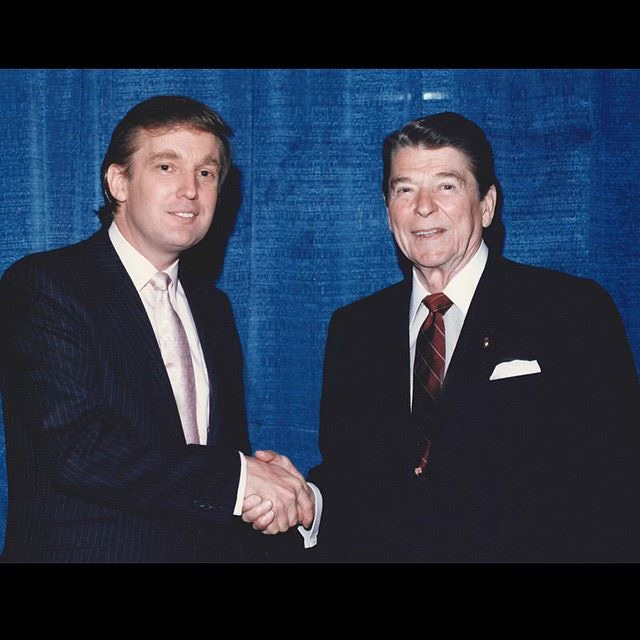
So how does this connect with foreign relations and trade? Ronald Reagan is a good place to start.
In 1987, when America was clearly on the rise, and not long after Reagan delivered his legendary “tear down this wall” speech, Trump spent a fortune to run a full-page ad with his views on American foreign policy. He didn’t name Reagan. But he wrote, “the world is laughing at America’s politicians.” To a narcissist forever haunted by the feeling he will be exposed as a fake, a fraud, a loser, to be “laughed at” is the worst fate. Throughout his entire life, Trump has used that exact phrase as the ultimate condemnation.
And why was the world laughing at the United States? Because countries like Japan had gotten rich by ripping off the United States, Trump wrote, all while enjoying the protection of the American military paid for by the American taxpayer. “Make Japan, Saudi Arabia, and others pay for the protection we extend as allies,” Trump wrote in 1987. “Let’s help our farmers, our sick, our homeless by taking from one of the greatest profit machines ever created — machines created and nurtured by us. ‘Tax’ these wealthy nations, not America. End our huge deficits, reduce our taxes, and let America’s economy grow unencumbered by the cost of defending those who can easily afford to pay us for the defense of their freedom. Let’s not let our great country be laughed at anymore.”
Change a few names and that could be from the transcript of Trump’s remarks this week as he was blowing up global trade.
Trade is not mutually beneficial, in Trump’s way of thinking. It is zero sum. There are winners and losers. If one country sells more to a country than it buys, that surplus shows it is the winner; sell less than you buy and that deficit proves you’re a loser. Write that on an economics exam and you will both fail and instil despair in your professor. But that’s what the president thinks.
The United States runs trading deficits with most countries, not because it is richer than everyone else, and can afford to buy more than anyone else, and buying stuff you value is a pretty sensible thing to do when you’re rich. No, the United States runs trade deficits because it is being ripped off. You don’t need to look into the details of particular tariffs and trade barriers, of who is buying what and why, to know that. You simply need to know another country is selling more in the exchange, making America the loser. The solution is for the United States to use its immense economic and military muscle to force others to trade on America’s preferred terms — you buy more than we do or else — so others lose and America wins. Then they won’t laugh at us.
That was Trump in 1987. That is Trump in 2025. His thinking hasn’t budged an inch. Because it’s not thinking. It’s a reflection of his own twisted psychology. And that never changes.
That’s my Grand Unified Theory of Trump.
It helps explain the bizarre history of America Trump has developed in his mind.
For Trump, it cannot be true that America was a rich nation that got a lot richer during Donald Trump’s lifetime and is now by far the world’s richest. It simply cannot be true. If it were, glory would go to the leaders who created the global system after the Second World War, and those led it for the past half century. Meaning less glory for Trump.
So America was “looted, pillaged, raped, plundered” the whole time.
Every modern president was the worst.
John McCain wasn’t a war hero.
Ronald Reagan was “laughed at.”
But in a mere matter of weeks after Donald J. Trump became president, nothing less than a new Golden Age began. (Seriously, that’s how the White House press releases read. Mao would have told them to tone it down.)
The analysis before the birth of the Great Man is entirely different, of course. It’s OK for some things to have gone right then because Donald Trump didn’t exist and praising leaders of those eras doesn’t mean less glory for Donald Trump.
Combine that psychology-driven dynamic with the fact that William McKinley made his name as a proponent of tariffs and that’s how we get to an American economic history in which everything after the Second World War is failure and misery and the McKinley era is the height of American prosperity. (It also helps that Trump and his fans ignores anything about McKinley that doesn’t fit, notably his famous, final speech, which is a essentially a sweeping repudiation of Trump’s “America alone,” dog-eat-dog worldview. Sample: “God and man have linked the nations together. No nation can longer be indifferent to any other.” Not very Trumpian, is it?)
History. Economics. Policy. With Trump, it always starts and ends with psychology.

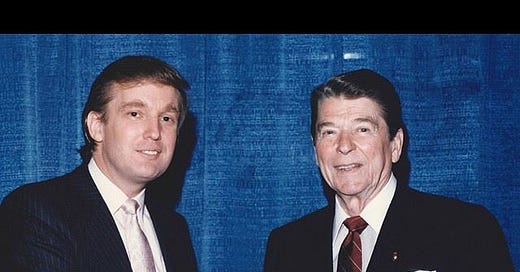


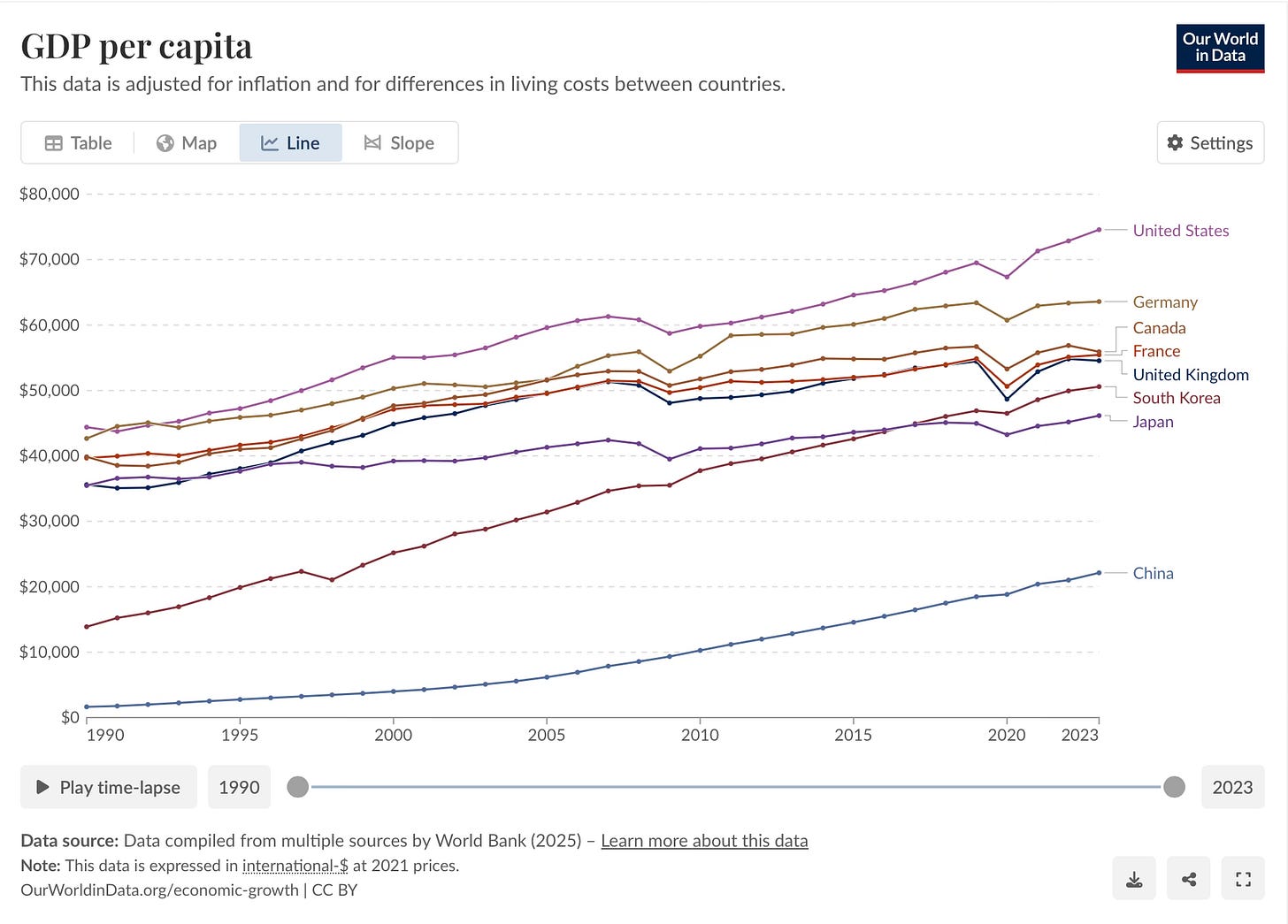
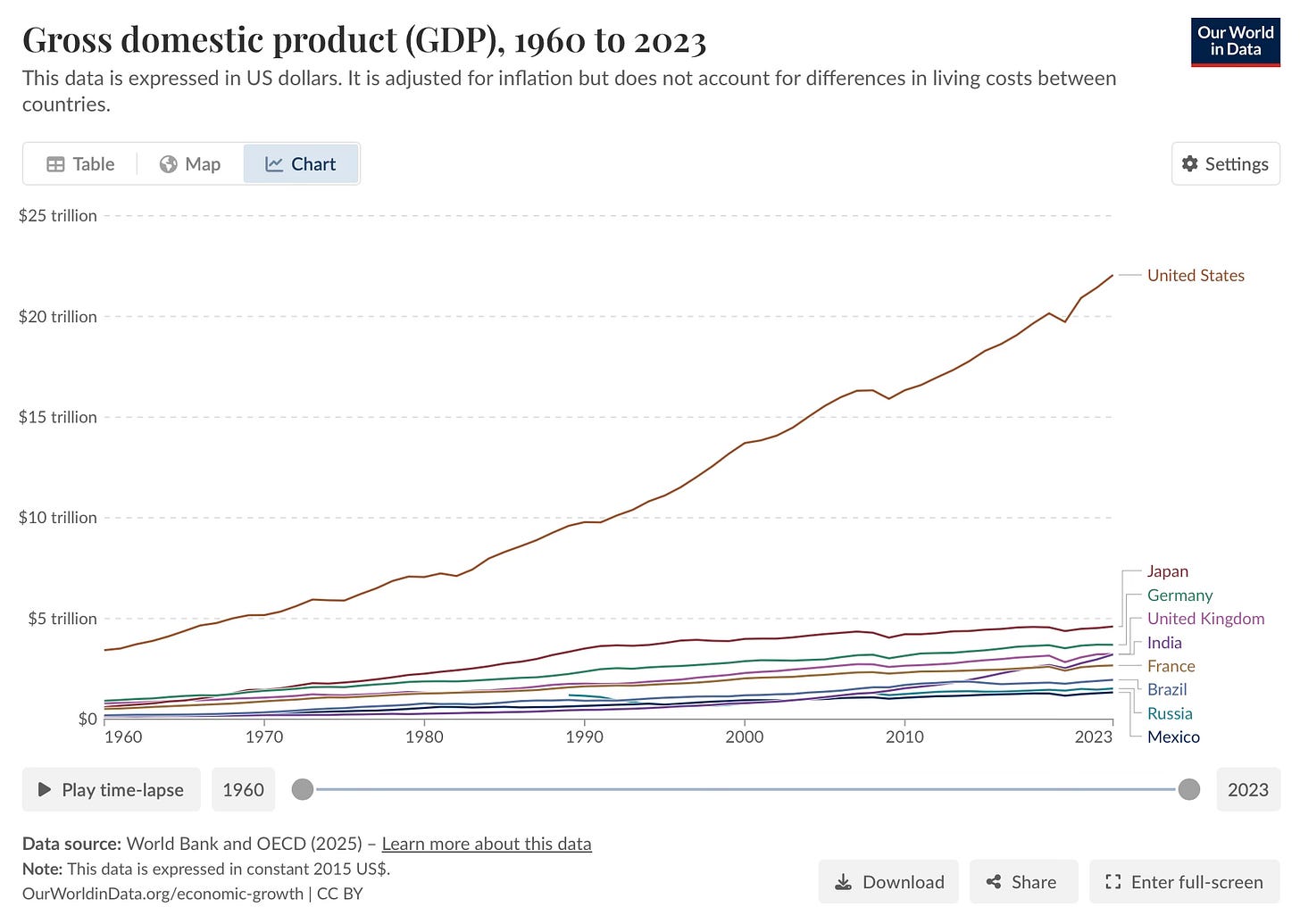
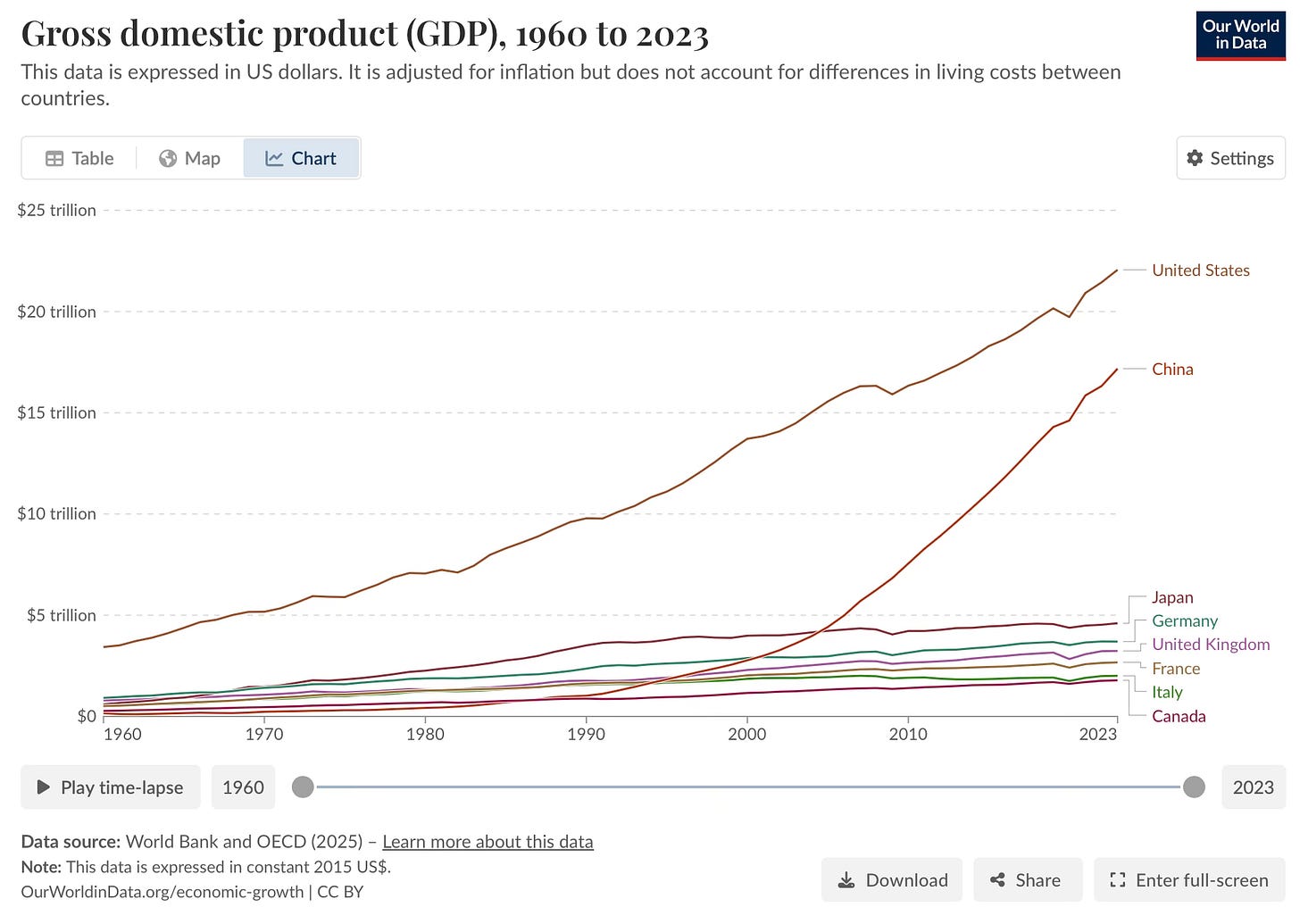
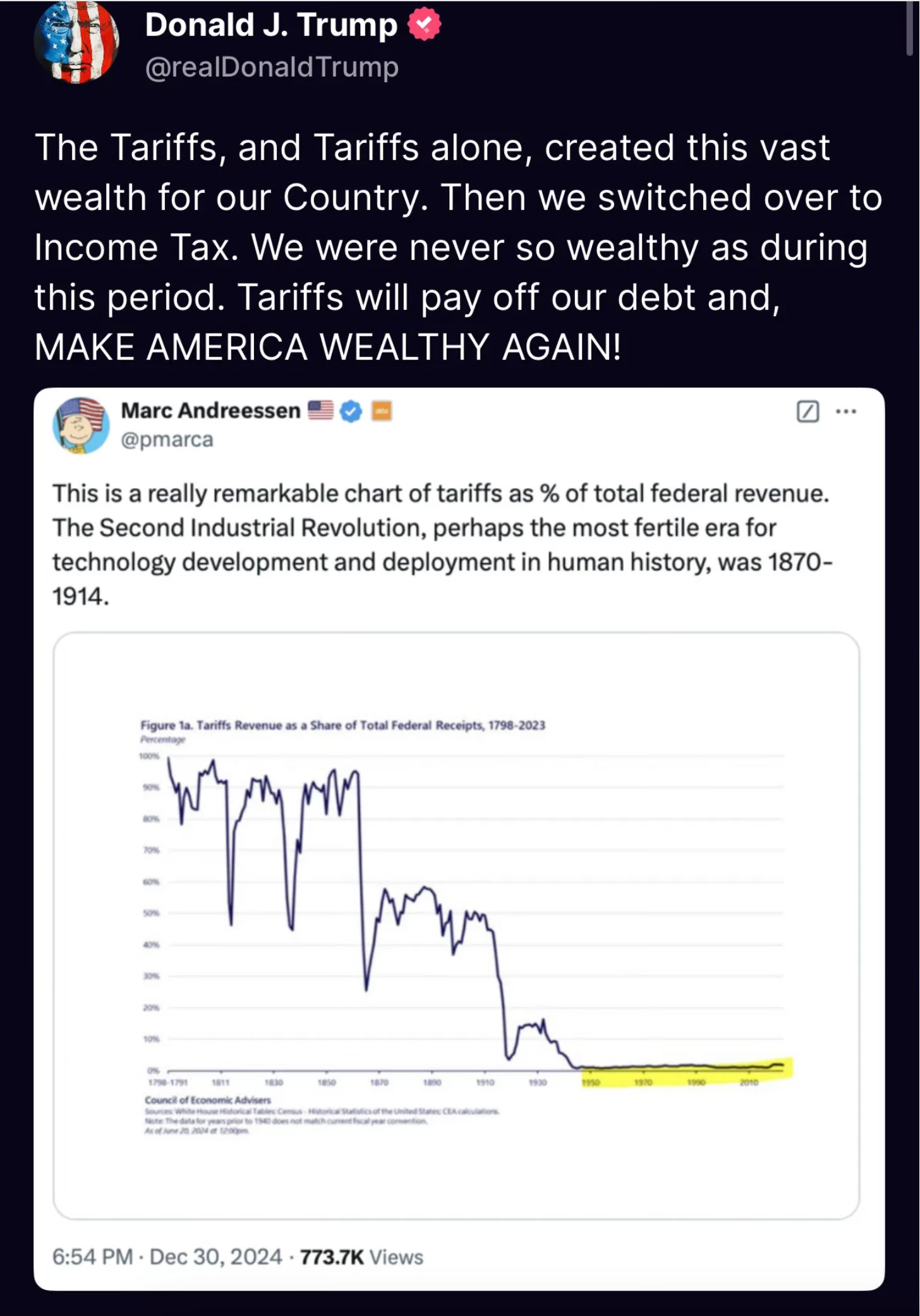
This is excellent.
I would add that support for Trump also starts and ends with psychology.
Most of the narratives of the 2024 election are garbage, because they assign a rationality to Trump voters that didn’t exist. Usually it’s some version of how those voters were responding to the hardship of [inflation/whatever] and if only the Democrats had understood this etc.
The truth is that most Trump voters were just fine. They certainly weren’t facing the sort of hardships that might force otherwise rational adults to turn to an obvious charlatan like Trump. Those stories about hating inflation were after-the-fact justifications for their votes, but they were never the motivator.
The Trump votes were driven by psychology. Mostly: a child-like psychology of shallow selfishness. Materially comfortable but bored, aimless types voted for him because (i) they swallowed the culture war propaganda, (ii) they don’t know or care what makes their country and their communities work so well and/or (iii) they enjoy indulging their darker feelings about ‘others’. These are the people who live a life of play, and don’t see any reason to grow up.
First, so sad that smart people have to spend so much time thinking about someone so stupid, including psychoanalysis. Really is.
Second, while I'm no professional strategist, I did spend two years as a civilian faculty member at the (US) National War College leading seminars with top-notch deep state career professionals from our military services and civilian agencies and "partner country" counterparts (at least I hope they still are) thinking about national security strategy. Why do I say this here? Because the first step in strategy--to impose a temporal sequence on an iterative process in an infinite game--is to assess the strategic context and to identify the "problem" you're trying to solve. (Easier said than done).
But if you don't bother even trying to understand the strategic context, you'll (inexorably) misidentify the problem. Then guess what? Your strategy will be aimed at solving the wrong problem, including one that (as you rightly point out) might not even exist. It turns out you can expect roughly the same result from this kind of mistake as a doctor treating a disease that has been misdiagnosed (or that might not even be a disease, notwithstanding your invasive surgery), only magnified to scale by the fact that it is a comprehensive (political, economic etc.) problem involving millions of of people, and in this case scores of nations across the globe.
I think this is precisely what you have identified our dear leader (don't know what else to call him) doing, but that's just the start of the multifarious mistake. So where else can we expect this madness to lead than unmitigated disaster?
PS - Boy would I love to be wrong about this.